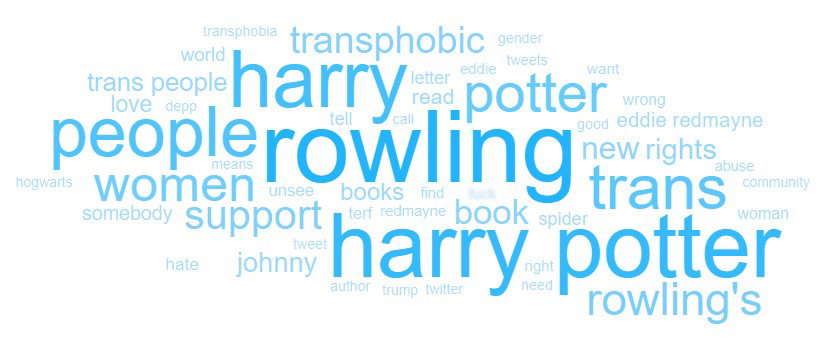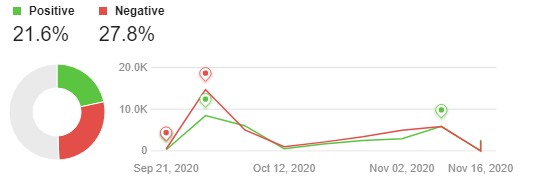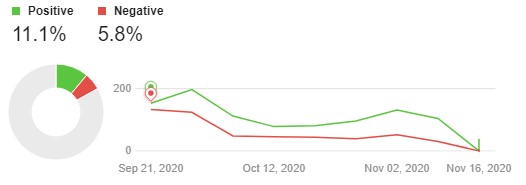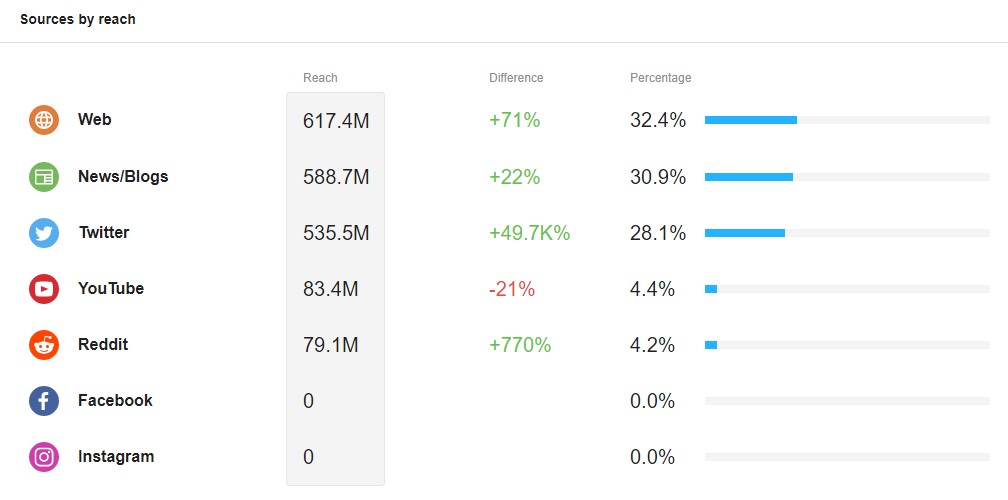JK Rowling online reputation analysis

If you’re in your 20s-30s right now, chances are Harry Potter books were a formative childhood experience for you. They were for me — I remember anticipating the release of each book and asking my mom what some words meant. These books were the first thing to ignite my love for language and text. Perhaps, we could trace the path from me reading The Prisoner of Azkaban to me writing this article today.
I think many people share sentimental feelings about the Harry Potter universe and project these feelings on its creator as well. JK Rowling had always been the person who created this magical world where friendship and love can beat all evil — and millions of people are grateful to her for that. But lately, something has changed.
Depending on how much online you are, you may have heard glimpses or read some tweets describing the controversy around JK Rowling. She even had to make a public statement where she used the word "bullying" to describe an influx of social media hate she had received. So what's really happening?
Luckily, I have a way to solve this mystery! Awario does an amazing job analyzing and managing online reputation. It is able to tell how people feel about a certain person or brand, what exactly they say, and what exactly influences their opinions. So I didn't hesitate to use Awario to analyze the reputation of the famous (or infamous) writer.
This incident is a great example of how one mistake on social media can lead to a full-blown reputational crisis. We at Awario thought that it was an interesting case to break down and show how social listening can help with your reputation management. While the debate is heated on both sides, we wanted to stay away from the argument and look at the cold-hard data. What does social listening analysis tell us about the discourse around JK Rowling.
This article could be used as a how-to for reputation analysis with a social listening tool. I'll go through all the steps necessary to understand how the public feels about your brand or person and give some actionable tips in the end.
JK Rowling's reputation: a social listening analysis
When it comes to reputation analysis, speed is one of the most important qualities you can have. You need to find a potential scandal and nip it in the bud before it becomes too big to handle. That's why a precise algorithm of actions is very important. The main principle is to start from more broad analytics and data points and move on to the more specific ones. That workflow allows you to check for data anomalies right away and then find the source of these anomalies if there are any.
Before we start the actual analysis of JK Rowling's online reputation, let's briefly look at the demographic and behavioral analytics that Awario pulled from her mentions. This will let us know how to mitigate a PR crisis: we learn what channels we should use to communicate with the angry public and who this angry public is.
I've started monitoring conversations around JK Rowling in September and since then Awario managed to find and analyze 284,5 thousand online mentions. The main source of such conversations was Twitter — this was expected since the main controversy which caused this reputational disaster was centered around a tweet made by the author. But let's not get ahead of ourselves.

Expectedly, countries that discuss the author of Harry Potter the most are the US and Great Britain. The percentage of mentions is almost equally dispersed between men and women.

Now that we learned a bit more about JK Rowling's audience, it's time to start our online reputation analysis. Some people assume that online reputation analysis starts and ends with sentiment analysis — but that's not entirely true. A lot of social listening analytics can give us a clue on how the Internet feels about a brand or a person. Here's the workflow that covers all the steps necessary for a comprehensive online reputation check.
By signing up I agree to the Terms of Use and Privacy Policy
Step one: take a look at the number of mentions
Let's start with the social listening basics. The first thing you should do when you check Awario's analytics is to look at the number of mentions for a certain period of time. If we are doing a reputation check, I think one month is optimal — this allows us to see the sudden changes in the number of mentions while still staying up to date. The reason we start with this metric is that a sudden spike in mentions shows a hot topic: this could be a great news story about your brand or a burgeoning social media scandal. Unfortunately, for JK Rowling it was the latter.
Awario's Insights feature highlights sudden spikes in mentions and shows what could cause these spikes: whether it was a heart-warming story or a controversy.

So what do we discover when we check JK Rowling's stats? We immediately see the root of the issue — the Internet has accused JK Rowling of transphobia.
Back in June, the author retweeted an article that used the word "menstruators" and made a sarcastic comment about it. Many people felt like it was an irony directed at trans people and replied to this tweet with outrage.
‘People who menstruate.’ I’m sure there used to be a word for those people. Someone help me out. Wumben? Wimpund? Woomud?
— J.K. Rowling (@jk_rowling) June 6, 2020
Opinion: Creating a more equal post-COVID-19 world for people who menstruate https://t.co/cVpZxG7gaA
If you're a brand or a public person whose reputation is extremely important for their livelihood, at this point you'd probably apologize. You would put out a statement in support of trans people, perhaps punish the person responsible for an insensitive tweet. However, that's not what the famous author did.
Instead, she put out a lengthy blog post. The blog post didn't denounce transphobia and instead accused the Twitter community of bullying. In addition to that, JK Rowling tried to explain her views on gender and these explanations didn't manage to appease her opponents. All in all, these actions didn't lead to putting out the PR crisis at hand.
What she should have done instead is apologize. In a PR crisis when your client is accused of bigotry, the best thing to do is to put out a short and clear apology and a statement of support for a marginalized group. Don't go on a tangent trying to explain your reasoning — you may feel like the smartest person in the room, but this won't help your reputation.
Step two: check Topic cloud
Of course, we already found the issue thanks to Awario's Insights. The Topic cloud allows us to grasp a little bit more context from the mentions without going to the Mention feed and see the main topics of conversation around our client.

Let's take a look at JK Rowling's Topic cloud that includes the data gathered since September. As we can see from Awario's analysis, the scandal still had relevance even 3 months later. Transphobia still was the main topic of conversations around JK Rowling in September and October. Out of all the terms and phrases commonly used with her name, transphobia has almost as much weight as Harry Potter.
Another point of criticism was engendered by another series JK Rowling is responsible for. The Fantastic Beasts and Where to Find Them film series is based on her writing and it involves Johnny Depp, who had his own public scandal a few years ago. He was accused of domestic abuse and social media users didn't like the fact that he was featured in the film series. As you see, Johnny and his co-star Eddie Redmayne are featured in the Topic cloud as well.
people who people who
— seamus gorman (@gormanseamus) November 6, 2020
don’t like jk support
rowling johnny depp
?
boycotting
fantastic beasts
If you're analyzing your client's reputation, I'd suggest checking the Topic cloud with the mentions from this week — this lets you see what people are talking about right now.
Step three: Look at the most popular social media posts
So we found the pain points and we gathered a little bit more insight into conversations around our client. Let's now take a look at the online mentions with the most reach to find out how exactly people are criticizing JK Rowling.
One Twitter thread that went viral during this time was about her poor knowledge of languages that inspired Harry Potter spells and a lack of research around them. The first tweet of the thread has 2.8 thousand retweets and 4.7 thousand likes. This thread also presented the famous author as a bit ignorant of other cultures and unwilling to learn more about them, so this couldn't be good for her reputation either.
Because I'm petty, I'm going to gather you all around and tell you about that time JK Rowling was extremely wrong about something and, by being wrong about it, poisoned Google search results for it for years afterwards and generally made the world ignorant about it
— Arthur Chu (@arthur_affect) September 29, 2020
As you see, the Internet has a lot of reasons to criticize JK Rowling. But does it actually affect her reputation?
Well, according to Awario, it's not as big of a hit as it could seem.

The number of negative mentions is quite high but not overwhelming — and there are still people who support her no matter what. Moreover, JK Rowling's main creation, Harry Potter and the magic school he went to is mentioned much more often online than the author herself.

In addition to that, when we remove Twitter data from Awario's analytics, we can see that the percentage of positive mentions is actually higher.

Of course, we can't neglect Twitter since it's the biggest conversation generator for her, but it's not the biggest in terms of reach. Since JK Rowling is probably the most successful children's writer in the history of literature, she is mentioned in huge media publications such as BBC and The Guardian, which get a lot more views than a viral Twitter thread.

All in all, we can make a conclusion that JK Rowling's reputation suffered a big blow for a specific type of audience: young people who probably have strong politics and spend a lot of time on Twitter. For more casual Harry Potter fans who use other social media platforms or don't have a social media presence at all, she's still well-liked.
That's why it's important to use social listening to segment and understand the audience you are working with. If we actually analyzed the reputation for an actual client here, we could suggest them to put out a message targeting the specific Twitter audience and catering to their strong political views.
What have we learned?
- One mishap online could lead to a very impactful and lasting blow to one's reputation. Be cautious of what you post on social media, how you comment and interact with people. Once you express a controversial or simply politically-charged opinion, people might get so outraged that they will no longer criticize your opinion — they'll start criticizing you.
- A PR crisis is not always happening everywhere at once: considering how segmented the Internet is, a scandal can spread only on one platform or in one community without reaching the general public. However, it doesn't mean that you can ignore it.
- To safeguard your reputation, monitor your brand or your name (if you're a public person). That way you'll be able to see if there's an emerging social media scandal and handle it gracefully right away.
- Don't be afraid to apologize! Sometimes it's much better (for your reputation) to apologize than to offer long-winded explanations.
I hope that managing your online reputation is a bit easier than JK Rowling's — and if you want to keep it that way I suggest you try Awario! You can test it for 7 days for free and check how many positive mentions your brand gets!
By signing up I agree to the Terms of Use and Privacy Policy













